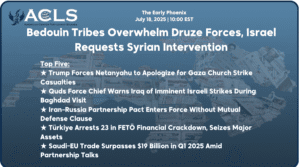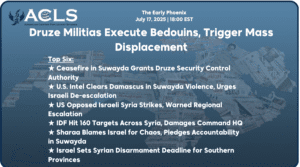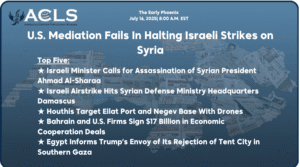Gulf Region Experiences Unprecedented Economic Fallout, Egypt Mediates Conflict, and Turkey Concentrates on Internal Threats
By: Rania Kisar
=======================
★ The Arabian Gulf
Saudi Arabia and Kuwait Already Report Economic Fallout from Houthi Attacks in Red Sea.
Previously hypothetical concerns about the global impact of Houthi attacks in the Red Sea are now becoming tangible realities for Gulf countries, particularly Saudi Arabia and Kuwait. The security incidents have led major shipping companies, including Denmark’s Maersk and Germany’s Hapag Lloyd, to halt their shipments through this critical commercial artery. As a result, the disruptions are having significant implications for the oil supply chain and pricing, underscoring the growing threat to regional stability and global energy markets.
In the wake of the tangible threats posed by Houthi attacks in the Red Sea, Saudi Arabia experienced a notable economic repercussion in the third quarter of 2023. The Kingdom saw a 10% decrease in net foreign direct investment (FDI) flows, amounting to 11 billion riyals ($2.93 billion), down from 13 billion riyals ($3.47 billion) in the preceding quarter. This downturn coincides with a period of heightened regional tensions, including the Israel-Hamas conflict and Houthi activities, which have likely influenced investor sentiment. Notably, this reduction in FDI flows occurred following the Saudi Statistics Authority’s implementation of a new IMF-aligned methodology for calculating these investments.
The broader implications of the Houthi attacks in the Red Sea, extend beyond Saudi Arabia to include Kuwait. Kuwait, facing a budget deficit exceeding $19 billion for the fiscal year 2024-2025, encounters a significant challenge. The country’s economy, heavily reliant on oil revenues, is particularly vulnerable to global oil price fluctuations. The Houthi attacks exacerbate this vulnerability, potentially leading to increased oil price volatility and impacting Kuwait’s oil revenue projections, a critical component of its national budget. These incidents illustrate the interconnectedness of regional security, global energy markets, and the financial stability of oil-exporting nations.
=======================
★ EGYPT
Egypt Mediates Israeli Security Concerns, Ceasefire Before Ramadan, And Coordinates With Hamas.
Israeli security expresses grave concerns about senior Hamas figures and Israeli prisoners being smuggled from Gaza into Egypt. Reports emphasize heightened smuggling fears in the Gaza-Egypt border area, particularly through the Philadelphia Corridor. Israel alleges Hamas weapon smuggling from Egypt and seeks to increase presence there to halt hostage and leader smuggling. Egypt refutes Rafah crossing smuggling claims and demands Israel provide evidence. Israel plans limited military operations in the area despite Egyptian objections. The situation reflects a tense standoff, with Israel aiming to secure the border amid calls for tunnel proof.
Egypt is pressuring Israel to end the Gaza war before Ramadan to prevent a regional explosion. Israel faces fears of escalating tensions if no ceasefire is reached. Hamas leader Ismail Haniyeh is expected to visit Cairo for talks, and Israeli Shin Bet Director Ronen Bar recently met with his Egyptian counterpart to discuss hostage issues, preventing weapons smuggling into Gaza, and post-war plans. CIA Director William Burns also participated in talks in Paris with Egypt, Qatar, and Israel to discuss a ceasefire in Gaza. Egypt is urging the United States to exert more pressure on Israel to achieve a ceasefire.
Hamas officials are meeting with Egyptian intelligence in Cairo to discuss a Qatar-brokered truce proposal. The proposal involves a three-stage ceasefire with a focus on releasing hostages held in Gaza since October 7, starting with civilians, followed by soldiers, and eventually the deceased hostages’ bodies. Both sides are expected to halt military operations during these phases. However, Israeli Prime Minister Benjamin Netanyahu rejects ending the war or releasing prisoners until Israel’s objectives are fully met, despite reports of potential concessions. Strategic Affairs Minister Ron Dermer is discussing the Gaza conflict and hostage release efforts with US National Security Advisor Jake Sullivan. Israel’s war cabinet tentatively supports the deal but anticipates a resumption of the conflict post-agreement.
=======================
★ TURKIYE
Turkiye Seeks Tripartite Cooperation Mechanism With Baghdad and Erbil Linking Security, Water, Energy, and Economic Files.
In recent high-level talks, Turkiye has advanced a proposal for a tripartite cooperation mechanism with Baghdad and Erbil, aiming to integrate security, water, energy, and economic concerns. Ibrahim Kalin, the head of the Turkish Intelligence Service, engaged in two rounds of discussions in Baghdad and Erbil within a week, focusing on regional developments, counter-terrorism efforts, and the ongoing conflict with the Kurdistan Workers’ Party (PKK). These talks culminated in a significant meeting in Ankara, where Turkish and Iraqi officials outlined a roadmap to deepen bilateral cooperation. Key points of agreement included a joint commitment to combat PKK activities, resolve water resource disparities, and facilitate Iraqi oil transportation. Concurrently, Turkish forces reported the elimination of three PKK fighters in Northern Iraq on January 30, 2024.
=======================



